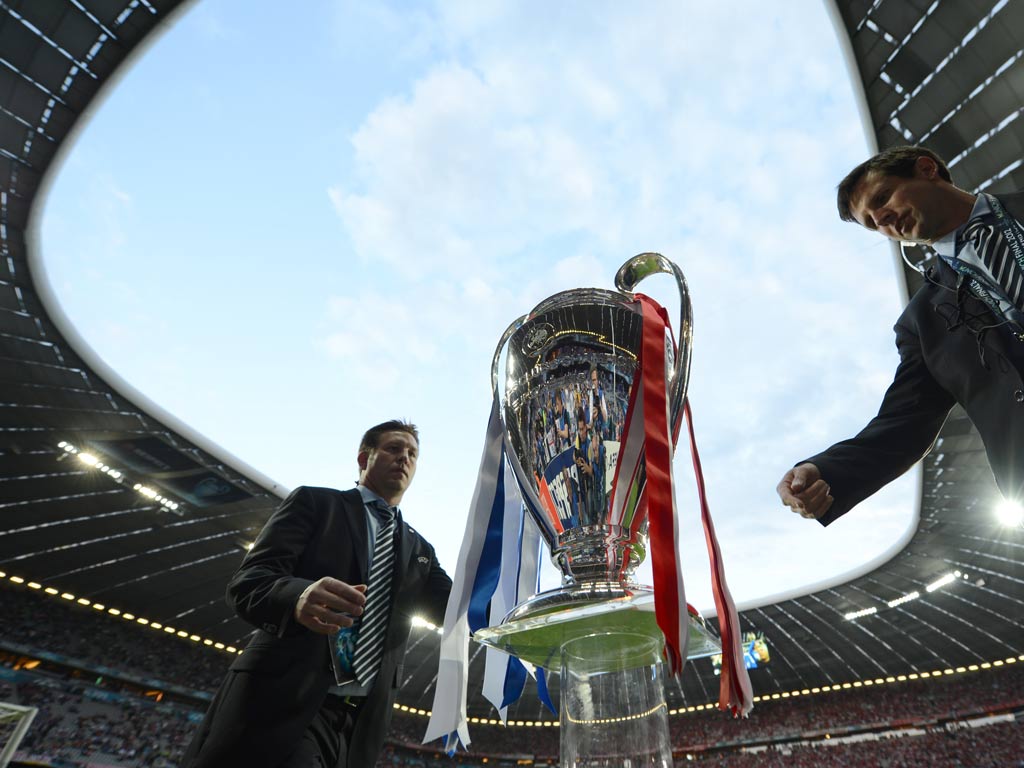Uefa consider doubling size of Champions League from 32 to 64 teams
Proposal would see Europa League scrapped

Your support helps us to tell the story
From reproductive rights to climate change to Big Tech, The Independent is on the ground when the story is developing. Whether it's investigating the financials of Elon Musk's pro-Trump PAC or producing our latest documentary, 'The A Word', which shines a light on the American women fighting for reproductive rights, we know how important it is to parse out the facts from the messaging.
At such a critical moment in US history, we need reporters on the ground. Your donation allows us to keep sending journalists to speak to both sides of the story.
The Independent is trusted by Americans across the entire political spectrum. And unlike many other quality news outlets, we choose not to lock Americans out of our reporting and analysis with paywalls. We believe quality journalism should be available to everyone, paid for by those who can afford it.
Your support makes all the difference.Uefa are considering a proposal to double the number of teams in the Champions League from 32 to 64 teams.
The idea would see European football's governing body scrap the Europa League.
"We're discussing it. We will make a decision in 2014. Nothing is decided yet," Uefa president Michel Platini told French newspaper Ouest-France.
The proposal is likely to be met with dismay, with many feeling the Champions League has already been diluted with the inclusion of teams from uncompetitive divisions in Europe and others that have finished as low as fourth in their domestic division. A league of champions it certainly isn't.
An extension to a 64 team competition could see as many as seven teams qualify from England, rather than the current four.
Uefa are looking at changing the existing format of European competitions, with an implementation date of 2015 for any alterations.
The amount of money generated by the Champions League is a motivating factor while the Europa League, which was re-branded from the Uefa Cup, has struggled to hold the attention enjoyed by it's sister competition.
"There is an ongoing debate to determine what form the European competitions will have between 2015 and 2018," added Platini.
The Europa League, which Fulham reached the final of in it's first year, has been criticised for the number of games involved. The current format sees a group stage leading to a final 32, meaning a marathon 14 matches to reach the final.
With many teams having to come through qualifying stages just to make the competition, as Fulham did, that number can increase. The west Londoners played an extra 19 games during the 2009/10 season.
Another proposal understood to be under consideration is offering a place in the Champions League as a prize for winning the Europa League. The prize may encourage teams, many of which rest players for Europa League matches, to take the competition more seriously.
Also under review is the current format which sees teams finishing third in the Champions League group stage dropping into the Europa League's last-32. The practice has often been criticised for devaluing the Europa League as well as being unfair on those that have battled through the group stages to make the later round.
Change has always been embraced by the European competitions, with the Champions League, then called the European Cup, at first involving just 16 teams. Group stages have since been introduced while at one stage the format involved two group phases, although it was scrapped after proving unpopular.
There have been rumours that a break-away competition involving Europe's top teams could be created, although Platini does not foresee such a move.
"It's a question that is regularly brought up," he said.
"I can't see how it could work outside the Uefa framework. Who will referee them? In what stadiums will they play?"
Join our commenting forum
Join thought-provoking conversations, follow other Independent readers and see their replies
Comments